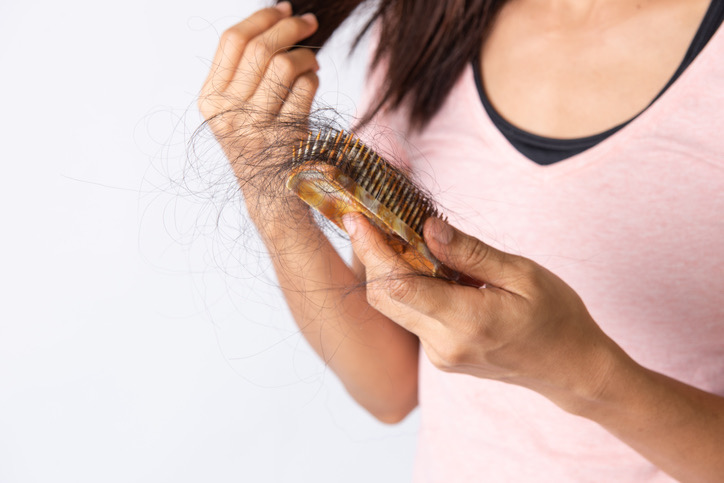Can Vitamin D Deficiency Cause Hair Loss?
Vitamin D has been much in the news for its many benefits, but did you know it may also help hair loss?

Vitamin D is understood to be one of the most important nutrients required for the body to function optimally and for an individual to be healthy.
It is also famous as the nutrient our body can absorb simply through exposure to sun.
So a deficiency in this essential vitamin can have many negative consequences, and has even been linked to hair loss directly and indirectly.
If you have a vitamin D deficiency then that can lead to conditions that cause hair loss as a secondary symptom, and there is evidence to suggest that vitamin D is directly involved in supporting the process of hair growth and hair follicle health.
Symptoms of vitamin D deficiency
If you not taking any form of supplementation, and don’t have regular sun exposure, then you may experience some of the following:
– Fatigue and tiredness
– General aches and pains
– Overall weakness
– High blood pressure
– Depressed feelings
– Excessive perspiration
Role of vitamin D in hair loss
If you do not have enough vitamin D for your body’s needs there can be many health consequences, many of which can lead to hair loss or thinning hair.
A study from the Dermatology Online Journal discussed research on the role of vitamin D in hair disorders and the cycling process of the hair follicle.
They found that it plays an important role in the differentiation and proliferation of keratinocytes, the highly specialized epithelial cells which make up over 90% of the cells of the epidermis, the outermost layer of the skin.
Keratinocytes are understood to be involved in the development of epithelial cells which are required for healthy hair growth . Earlier studies available from the US National Library of Medicine determined that the use of keratinocyte growth factor promoted the survival of the hair follicle.
Ensuring that your body maintains appropriate and healthy levels of vitamin D is likely to support the processes involved in healthy hair growth where you most need it, at the point where hair growth starts. A study from the British Medical Journal also discusses the role of vitamin D in hair loss and the majority of available information list numerous health concerns connected to vitamin D deficiency.
Another role vitamin D may play in hair loss is discussed in research from the Turkish Journal of Medical Science that determines that maintaining sufficient vitamin D levels in the blood reduces the likelihood of experiencing the effects of telogen effluvium. This is a scalp disorder characterized by the thinning or shedding of hair resulting from the early entry of hair in the telogen phase (the resting phase of the hair follicle).
The study found that those diagnosed with telogen effluvium also had significantly low levels of vitamin D in the blood. This is a very common cause of diffuse hair loss and is a commonly occurring autoimmune disorder.
The resulting condition includes thinning hair, brittle and unhealthy hair, as well as hair that is easily dislodged from the scalp.
Conditions associated with vitamin D deficiency
There are a number of conditions and illnesses related to vitamin D deficiency and which in turn can have an impact on hair health, leading to thinning and loss.
Of particular interest for women however, is the fact that at Menopause there is definitely a rise in the risk for heart disease and heart attacks. According to research from the American College of cardiology, there may well be a link with severe vitamin D deficiency and heart disease so ensuring adequate levels is a sensible precaution.
Also, vitamin D is very important for bone health as it helps regulate the amount of calcium in the body so helps if you have a risk for osteoporosis, and it has also been linked with immune function and protection against cancer.
How to increase your vitamin D levels
The best way is with a combination of diet, exposure to sunlight, and to only use supplementation during the winter as please be aware that this is a vitamin that you can take too much of.
Taking too many vitamin D supplements over a long period of time can cause too much calcium to build up in the body (hypercalcaemia). This can weaken the bones and damage the kidneys and the heart.
The recommended maximum daily amount for supplements is 10-20mcg and usually the amount in a good nutritional supplement will provide enough for most people’s needs.
Foods high in vitamin D
Sources include:
– oily fish – such as salmon, sardines, herring, mackerel and fresh tuna
– red meat and liver
– portabello mushrooms
– egg yolks
– tofu
– fortified foods – such as most fat spreads and some breakfast cereals
– almond milk
In the UK, cows milk is generally not a good source of vitamin D because it isn’t fortified, as it is in some other countries.
Helpful information:
When hair starts thinning, which is common at menopause and with non ovulatory periods such as in PCOS, then what can happen is that when progesterone levels fall as a result of lack of ovulation the body responds by increasing its production of the adrenal cortical steroid, androstenedione, an alternative precursor for the production of other adrenal cortical hormones. Androstenedione conveys some androgenic (male-like-properties) – in this case male pattern hair loss.
If this is what is causing your hair loss, then when progesterone levels are raised by supplementation with progesterone in Serenity then the androstenedione level will gradually fall, and normal hair growth can eventually resume. Since hair growth is slow, it may take 4-6 months for the effects to become apparent.
Also, low thyroid can be indicated with hair loss so ask your doctor to have this checked. Progesterone supports thyroid function so again can be helpful.
https://anna.blog.wellsprings-health.com/9-things-to-know-about-female-hair-loss/


















